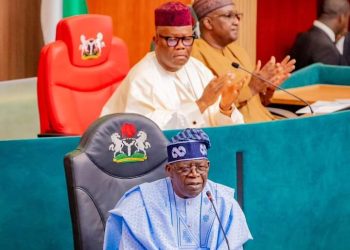President Bola Ahmed Tinubu has asked the National Assembly to approve a loan of ₦1.767 trillion, which is already part of the country’s external borrowing plan for the ₦28.7 trillion 2024 budget. This loan is expected to help cover the ₦9.7 trillion budget deficit for the coming year.
President Tinubu’s request was presented in letters read aloud during the plenary sessions of both the Senate and the House of Representatives on Tuesday, November 21, 2024. The letter, dated November 15, 2024, outlined the specifics of the loan and its purpose.
After the Senate President, Godswill Akpabio, read the letter, he directed the Senate Committee on Local and Foreign Debts to review the request and report back within 24 hours. “This loan request of $2.2 billion (₦1.767 trillion) has already been included in the 2024 borrowing plan, so it is essential we act quickly,” Akpabio said.
Medium-Term Economic Plans Sent to Lawmakers
In addition to the loan request, President Tinubu also submitted the Medium-Term Expenditure Framework (MTEF) and Fiscal Strategy Paper (FSP) for 2025–2027. These documents outline Nigeria’s financial and economic plans for the next three years and are crucial for drafting the 2025 federal budget.
Senate President Akpabio tasked the Senate Committee on Finance, National Planning, and Economic Affairs with reviewing these documents and reporting back within a week. The Speaker of the House of Representatives, Tajudeen Abass, also read a similar letter to members of the House.
Details of the Loan Request
President Tinubu explained in his letter that the 2024 Appropriation Act allocated ₦7.828 trillion for new borrowing to help fill the budget deficit of ₦9.179 trillion. This borrowing is split into ₦6.061 trillion in domestic loans and ₦1.767 trillion in external loans. The President’s current request focuses on the external portion.
The government plans to secure the $2.21 billion loan from several sources, including:
- Issuing Eurobonds
- Launching a Sovereign Sukuk in international capital markets
- Arranging bridge finance and syndicated loans
Tinubu emphasized that the funds would support critical projects in sectors like power, transportation, agriculture, defense, and security. These projects aim to stabilize Nigeria’s economy and promote sustainable growth.
Key Highlights of the 2025-2027 Economic Framework
The 2025-2027 MTEF and FSP include key assumptions that will shape Nigeria’s 2025 budget, estimated at ₦47.9 trillion. Some of the notable parameters include:
- An oil price benchmark of $75 per barrel
- Daily oil production of 2.06 million barrels
- An exchange rate of ₦1,400 to $1
- A projected GDP growth rate of 6.4%
Tinubu stressed the importance of the National Assembly’s quick approval of these plans, as they form the foundation for preparing the federal budget for 2025.
Amendment to Social Investment Programme Bill
In a separate letter, the President sought legislative approval for an amendment to the Social Investment Programme Bill. The proposed changes aim to improve the efficiency and transparency of government welfare programs, ensuring they better serve vulnerable Nigerians.
A significant part of the amendment is the creation of a National Investment Register, which will be used to identify and target beneficiaries of social investment initiatives. Tinubu explained that this would make the welfare programs more data-driven, ensuring that they reach those who need them the most.
“The amendment will make our social and welfare programs more transparent, efficient, and impactful,” Tinubu said. He added that these changes would strengthen the framework for implementing these initiatives and provide more effective protection for Nigeria’s poorest citizens.
What’s Next?
The National Assembly is now tasked with reviewing the President’s proposals. The Senate will decide on the loan request within 24 hours, while the economic framework and social investment amendments will be considered in the coming days.
With a focus on improving economic stability and addressing pressing social needs, these proposals represent a key part of President Tinubu’s plan to steer Nigeria toward growth and development.

